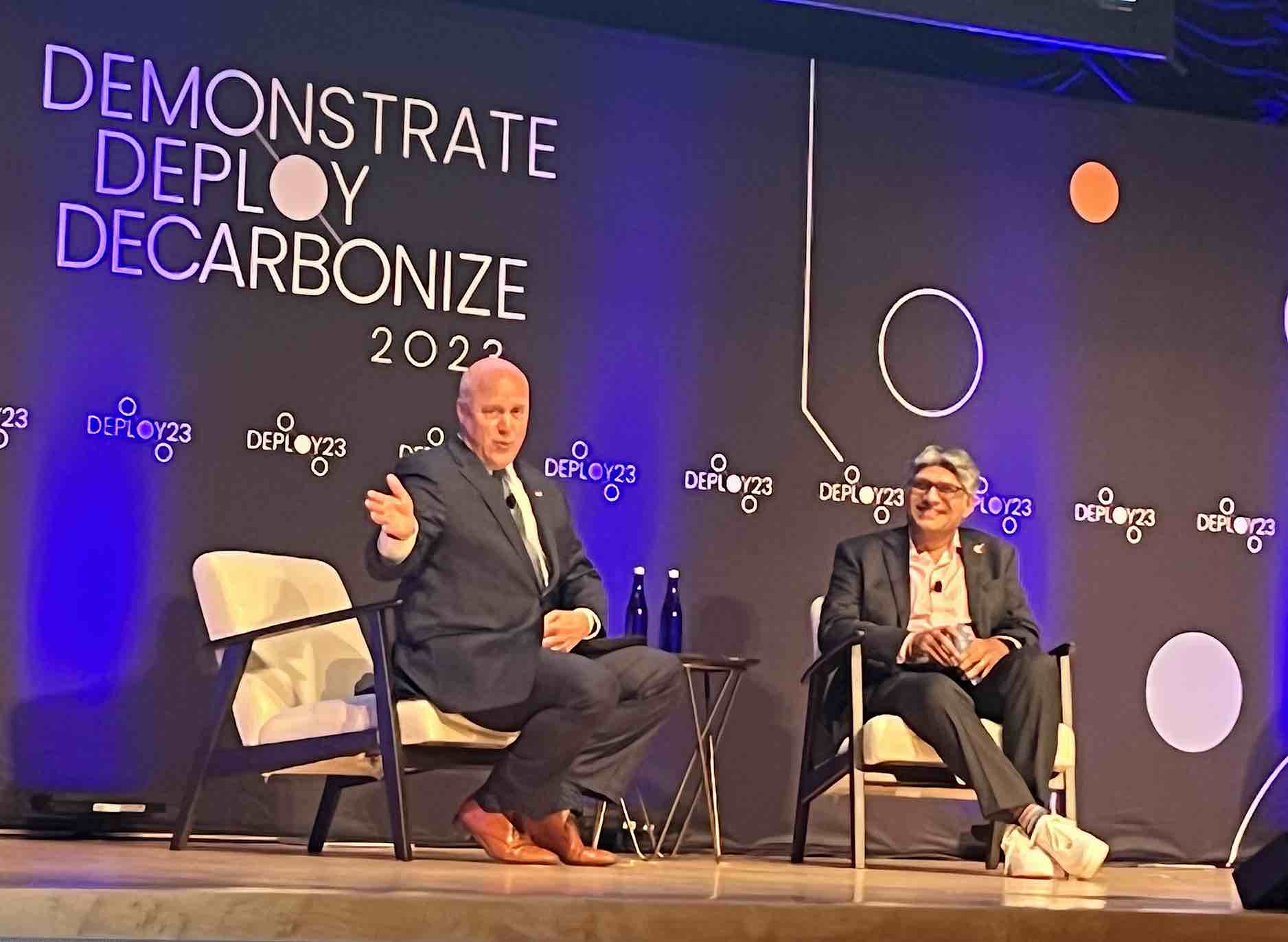ImpactAlpha, June 27 – ImpactAlpha’s spring season of Agents of Impact Calls spanned a period of tumult in the financial markets: instability in public and crypto markets, shifting winds in venture capital, and a multi-front backlash to ESG.
In seven Calls, entrepreneurs, investors and other practitioners shared examples and insights with thousands of ImpactAlpha subscribers and friends. Catch up on all of the insights:
Call No. 37: Ramping up the supply of carbon reduction to meet the urgent demand. In early February, carbon markets were soaring, with the price for a ton of carbon topping $100 on Europe’s emissions trading scheme. The Call was abuzz with talk of global carbon markets, offsets and credits, green premiums, blockchains and registries. That was before Russia invaded Ukraine and turned energy markets upside down.
The central message still holds: “This is a wake up call,” said CDP’s Paula DiPerna. “People see that there’s a high cost to inaction, per ton.”
- Driving prices. Demand for carbon reduction – including from corporations making their net-zero pledges – outstripped the supply of high-quality credits and offsets from projects that remove or reduce the gas. Corporations and funds stockpiling carbon credits in anticipation of higher future prices are further fueling the rise.
“Everybody wants to be able to pre-purchase their carbon and know that they have it taken care of, because they’re all feeling the squeeze,” said ReGen Network’s Gregory Landua. - Read the recap by Amy Cortese and watch the replay on YouTube.
Call No. 38: Inside the generational opportunity to reshape rules of corporate disclosure. Bottom-up policies for access to capital in divested communities. Top-down strategies to reshape capitalism to work for all stakeholders.
“We think that the connective tissue between those two represent particularly fertile opportunities for our field,” said Fran Seegull of the U.S. Impact Investing Alliance.
- The S.E.C.’s big shot. Regulators are grappling with externalities and how to price them in a way that allows investors to hold management accountable, said former Securities and Exchange Commission advisor Satyam Khanna. Between climate and human capital, “this is probably one of the most important sets of disclosure rule-making in a generation at the S.E.C.” Sign up to get updates from the Alliance.
- Read the recap by Dennis Price and watch the replay.
Call No. 39: Moving from ESG talk to action inside big companies. It’s one thing for a corporation to set environmental or social goals. It’s another to shift executives, employees and supply chains into action. Take “net zero,” the goal of balancing the carbon a company emits with the carbon it removes from the atmosphere.
“For a company like Walmart, getting to net zero essentially means the whole world has to transition to net zero. I’m not joking,” said Brendan Morissey, vice president of ESG at Walmart, which has a supply chain of tens of thousands of companies. “The question is, ‘What role do we play in helping to catalyze the right type of activity and move the ball forward?’”
Duke University’s Cathy Clark grilled Morissey, along with Sunya Norman, Salesforce’s VP of ESG, about how the two global corporations are moving from talking about environmental and social values to executing on ESG goals on behalf of all stakeholders.
- Read the recap by Dennis Price and watch the replay on YouTube.
Call No. 40: How impact investors embrace political risk to keep progress flowing. High-impact investments in fragile countries invariably entail political risk. And impact investments in humanitarian tech, a free press, financial inclusion and more may help mitigate such risks. Agents of Impact on Call No. 40 explored how to manage, rather than flee, political risk.
“We’re financing companies that generally face significant political risk, beyond the normal kind of country-level risk,” said Harlan Mandel of Media Development Investment Fund. “They’re often in a challenging relationship with their governments.”
- Boots on the ground. “Political risk is our friend,” said Jessica Bleyzer of SigmaBleyzer, which has invested $1 billion in Ukraine over 25 years. Bleyzer’s parents emigrated from Ukraine in the 1970s and 80s. Such risk “is undeniable when you’re trying to invest in countries like Ukraine.” Bleyzer says to weather conflict, SigmaBleyzer prepares its entities to be free of debt and to have plenty of cash on hand. With staff in-country, “we have an intimate understanding of how the country works, of the culture, of the problems, the pluses and minuses.”
- Diaspora. The talent flowing out of Ukraine, Russia and Belarus represents a new kind of global citizenship, said Daniel Kozlov of Global Venture Alliance, who left Moscow with his family after the invasion and joined the call from Hyderabad, India. “Maybe they can show the world that they also disagree with the current regime,” he said. “Maybe one day they will come back and rebuild the country once the political regime changes.”
- Read the recap by Dennis Price and watch the replay on YouTube.
Call No. 41: How investors are catalyzing climate capital for adaptation and equity. Climate disruption could spur investments in resilience that can buffer other shocks, from pandemics to invasions. “Our view is that this creates both an enormous impact and investment opportunity,” said Jay Koh of Lightsmith Group, which in January closed its $185 million Climate Resilience Fund.
Koh joined the Call to explore ways to catalyze more capital for climate adaptation and equity. Such capital is vital for the smallholder farmers who are integral to climate solutions, said Benjamin Njenga of Apollo Agriculture in Nairobi. Africa’s small farmers struggle to access capital and credit. Underinvestment in their farms causes low productivity and demand for more land, driving a destructive cycle of deforestation. Apollo is intervening with high-quality seeds, fertilizer, training in climate-smart practices, and insurance to protect farmers from extreme weather disruptions.
“These farmers are able to double or triple their production,” said Njenga. Having insurance helped farmers avoid ruin after a drought last year and enabled them to plant for the next season. In what was the speakers’ recurring refrain, Njenga said, “The big call is that we need to scale up these solutions.”
- Read the recap by Amy Cortese and watch the replay on YouTube.
Call No. 42: Business financing beyond venture capital to fuel the boom in entrepreneurship. One defining outcome of the pandemic is a boom in entrepreneurship. A record five million businesses were started in the U.S. last year. Many are sole proprietorships, but many are hiring and more want to bring on employees. Women, immigrants and entrepreneurs of color are leading the wave of new business starts.
The kicker: Venture capital and commercial banks back less than 20% of all new businesses. Call No. 42 explored alternative financing structures that are changing the trajectory of entrepreneurship and community wealth. A key question: Is the term “alt-capital” still appropriate when such instruments are designed for as much as 80% of the market?
- Wisdom of crowds. Crowdfunding is changing who invests – and who gets funded. “Power shouldn’t be concentrated in the hands of millionaires and VC funds,” said Jonny Price of WeFunder. “If we’re lowering the barriers to entry, and creating millions and millions of new angel investors who are women of color in Tennessee, where I live, then we should be able to get more capital flowing to founders that look like them.”
- Revenues over rounds. Revenue-based financing “looks at the strength of the business and the cash flows associated with that,” said Kim Folsom of Founders First. More than 60% of Founders First’s funding has gone to female founders, and 63% has gone to founders of color. Revenue-based lending “is a much more flexible source of funding that doesn’t rely on the individual’s personal financial credit.”
- Read the recap by Dennis Price and watch the replay.
Call No. 43: How responsible fintech in Africa provides resilience in a downturn. Just as investment in financial inclusion in Africa took off, a market downturn threatens to slow progress. Or does it?
“Contrary to what a lot of people think, I don’t think the downturn in the global markets is going to have such a profound impact on Africa,” Olu Oyinsan of early-stage tech investor Oui Capital in Nigeria said on this week’s Agents of Impact Call. “A lot of the investments that have gone into this space in the last few years have actually done very well.”
More than half of the $7 billion invested in African startups in the past 18 months has gone to fintech ventures.
- Resilience. As the global economy slows, what will change is the kinds of fintech ventures that get funded. “Unsecured consumer credit is a challenging model in times like this,” observed Amee Parbhoo of Accion Venture Lab. Startups supporting access to finance for productive uses, on the other hand, may prove more resilient. “The more resilient that companies can make their users, the more loyal those users will be,” said Scott Onder of Mercy Corps Ventures. “That’ll drive strong business fundamentals and more resilient companies over time.”
- Read the recap by Jessica Pothering and watch the replay on YouTube.











